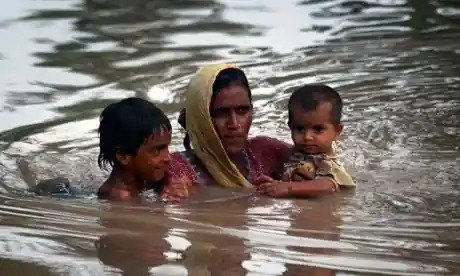Farzana Najibullah discusses how Western capitalist powers are responsible for environmental degradation, and how they hinder the real solutions to climate change.
Corporate giants use clever tactics to quickly make massive profits, but they don’t realize the climate crisis is caused by their rapacious exploitation of land use, water use, and fossil fuel, and their endless quest for profiteering is seizing our ability to breathe clean air.
By Farzana Najibullah
The Pakistan government and other organisations observed International Environment Day 2023. Such events are merely observed as an annual ritual. Sadly, no one is ready to recognise the gravity of the biggest problem on the planet and deliberate on the causes and the culprits responsible for environmental degradation and disasters.
Earth’s temperature has risen by 1.3 degrees Celsius since the start of the modern industrial order. Today we are bearing environmental costs externalized by high-carbon-emitting Western countries.
The world today is rapidly approaching the dangerous point of land use, and freshwater use. The lust for profit by big corporations and fossil fuel firms has led to the degradation of the environment, depletion of natural resources, and loss of biodiversity, especially in fragile ecosystems like the Himalayas, Karakoram, Hindu Kush, and Pamir mountains.
According to the World Health Organization, air pollution kills an estimated 4.2 million people annually, 2.1 billion live without safe water supplies at home, and 4.5 billion live without proper sanitation.
Oblivious to the grave situation, the proponents of neoliberalism, so-called development experts, policymakers, and rulers make us believe that mass tourism, big hotels, mining, unplanned construction, and consumerism are important ingredients for growth; they advocate ‘competitive self-interest’ and ‘hyper-individualism’.

The I/NGOs persuade us to address climate change and environmental degradation through frivolous awareness activities like walks, seminars, and the collection of trash by school kids rather than questioning the state and the corporations. Their share in carbon emissions is over 80 percent today. In 1992, about 90 percent of the world’s energy production was supplied by fossil fuels. Today, after 30 years of climate conferences, and enormous rhetoric about saving humankind and the planet, the figure has come down barely to 84pc.
Ironically these firms finance and support so-called ‘green initiatives’ to hide their crimes. Through lobbying, donations to NGOs, and financing global events like COP27 these corporate giants create a smoke screen around the issue and create hurdles for people’s movements, a collective check on their power, exploitation of nature, on the rapacious profiteering of our own landed, industrial, commercial, and financial elites and complicit state institutions exploitation of nature.
Experts say that while developed countries set up a loss and damage fund at the 2022 COP27 climate change conference, it does not account for the losses suffered by vulnerable countries such as Pakistan.

Whenever a disaster struck Pakistan, whether, in the form of an earthquake, floods, or even the COVID-19 pandemic, much of the funds or aid that came from abroad was utilized by the military without much oversight, resulting in further weakening of civilian institutions.
If the state fails to provide affordable public transport to the people, they will commute by car. If the government leaves people at the mercy of the private sector, for access to education and health they will be compelled to buy everything by selling their land and meager resources.
Only mass political consciousness political struggle for climate justice, reparations, decarbonization, and debt cancellation can alter the situation. Ironically the Western countries refuse to cut their emissions, let alone give us reparations. (To be Continued)

Farzana Najibullah is a former faculty member of KIU and has done MPhil in Educational Leadership and Management. Farzana is passionate about writing, teaching, and mentoring students. She has published academic research articles on contemporary educational issues. She focuses on advancing her knowledge in the areas of socio-economic issues of women, children, and the environment. She is currently completing an online course on Children’s Human Rights from Geneva University.

The High Asia Herald is a member of High Asia Media Group — a window to High Asia and Central Asia
